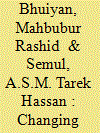|
|
|
Sort Order |
|
|
|
Items / Page
|
|
|
|
|
|
|
| Srl | Item |
| 1 |
ID:
167800


|
|
|
|
|
| Summary/Abstract |
The nature and means of conducting warfare have always been changing. Technology, political realities and ideologies continue to play crucial role in this transformation as witnessed in the two world wars, the Cold War, and in following decades. Non-state actors became more visible and important. Nowadays, many wars involve such actors against state parties, for example, the US global war on terror, Israel-Hezbollah War (2006) and the current war against the Islamic State (ISIL). The term hybrid war involves a combination of traditional and nonconventional means, has become a common subject of discussion. But hybrid war is nothing new and has been practiced since ancient times. Several countries have now resorted to hybrid war: one such country is Russia, who has been blamed by western countries in this regard, e.g., in Georgian War (2008), Crimea (2014), ongoing conflict in eastern and south Ukraine, disinformation campaign against the West and interference in their governance process. Russia similarly, blames them for its destabilization by increased military presence on its borders and inciting revolutions in neighbour countries. Meanwhile, countries are developing hybrid warfare capacities, including plans for deploying military robots. Non-state actors now also use hybrid means like the Hezbollah or ISIL and several ongoing wars are becoming growingly hybrid; besides, the clash of ideologies, i.e., religious radicalism vs. white supremacism can create conflicts, indicating future wars may be even more so. Yet, some old mechanisms and strategies are likely to remain relevant and useful in future wars as well, suggesting their true ever-evolving and hybrid character.
|
|
|
|
|
|
|
|
|
|
|
|
|
|
|
|
| 2 |
ID:
159614


|
|
|
|
|
| Summary/Abstract |
Russia, nowadays, vigorously displays its strength in global affairs, which it could not do after the fall of the Union of Soviet Socialist Republics (USSR). Vladimir Putin and Dmitry Medvedev made this possible by recovering the country’s former standing and equitable place in the world arena. The country’s reemergence has resulted in growing confrontations with the West. The Russo-Georgian War and the Ukraine Crisis deeply worsened Russia-West relations. There are other differences on, for instance, Syrian war, expansion of North Atlantic Treaty Organization (NATO) and Venezuela. The United States’ presidential election 2016 has also allegations of Russian meddling. Russia is now trying to form new alliances at regional and global levels, including expansion of relations with depressed Western allies to counterbalance Western preponderance. Albeit Russia and West both suffer from economic slump, their belligerent rhetoric and military postures go on where neither is willing to give up. Russian reassertion and Russia-West antagonism sometimes create fear of full-scale conflicts. This article examines the reemergence of post-USSR Russia under Putin and Medvedev, mutual perceptions of and interactions between Russia and the West, Russia’s role as a global player in recent times, and if Russia’s resurgence will create new conflicts. It is a qualitative research, drawing from secondary sources. It mainly argues that there are reasons both for and against conflict, but neither Russia nor the West can endure a real war.
|
|
|
|
|
|
|
|
|
|
|
|
|
|
|
|
|
|
|
|
|